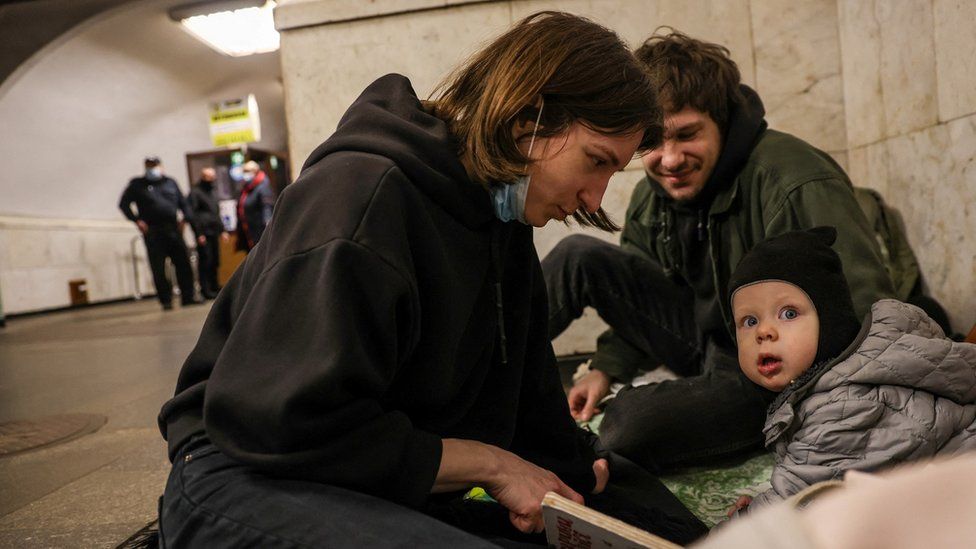 Ukraine’s army is trying to repel a full-scale Russian invasion, with fierce battles taking place close to the capital Kyiv.
Ukraine’s army is trying to repel a full-scale Russian invasion, with fierce battles taking place close to the capital Kyiv.
Fighting is raging at an airfield on the outskirts of the city, and it could become a springboard for the Russian army into Kyiv if its troops seize it.
The Russian assault is being fought on several fronts after it attacked from the east, north and south on Thursday.
There have been reports of several explosions in Kyiv.
Ukraine says dozens of people have been killed, while thousands have fled.
Moscow launched the offensive in the early hours of the morning, shortly after President Vladimir Putin declared war in a dramatic televised address. He threatened any country attempting to interfere with “consequences you have never seen”.
Air and missile strikes rained down on cities and military bases, before tanks rolled in across three sides of Ukraine’s vast border. It followed weeks of escalating tensions, as Russia massed troops around the country.
Ukraine’s President Volodymyr Zelensky, meanwhile, vowed to continue fighting. He said “a new iron curtain” was falling into place and his job was to make sure his country remained on its western side.
Mr Zelensky ordered conscripts and reservists in all of Ukraine’s regions to be called up to fight. The country’s defence minister urged anyone who was able to hold a weapon to join the effort to repel Russia.
But as night fell, fears of a Russian assault on the capital grew. Gunfire and explosions were heard in the city throughout the day and the president was quoted in Ukrainian media as saying “saboteurs” had entered Kyiv.
Western intelligence officials earlier warned that Russia was building an “overwhelming force” to take control of the city.
There was also fighting around the site of the former nuclear power plant in Chernobyl. Ukrainian presidential adviser Mykhaylo Podolyak said the nuclear site itself had been lost following a “fierce battle”.
The UK’s Ministry of Defence said Ukrainian forces were putting up “a staunch resistance” to the invasion but that “heavy casualties” had been suffered by both sides.
The toll on civilians quickly became apparent on Thursday, as thousands moved into neighbouring countries such as Moldova, Romania, Poland and Hungary to escape the conflict.
UN estimates suggest that more than 100,000 people have already fled from their homes.
“We don’t understand what we should do now,” one woman called Svetlana told the BBC. “We’re now going to a place where we can be safe and we hope we can leave safely.”
Human rights groups warned prior to the invasion that an attack could trigger a major refugee crisis in Europe.
In Kyiv, which is home to almost three million people, warning sirens have been blaring out as traffic queues to leave the city. Hundreds of people are seeking shelter for the night in metro stations, bomb shelters and basements.
Western leaders expressed shock and anger at the scale of the attack – which took place by land, air and sea – throughout the day.
The UK, EU and other allies vowed to impose tough new sanctions to punish Moscow but said they would not send in troops.
French President Emmanuel Macron held a telephone call with his Russian counterpart, in what was Mr Putin’s first conversation with a Western leader in days.
Mr Macron demanded an “immediate halt” to the offensive and threatened Mr Putin with “massive sanctions”, the French government said. The Kremlin, however, simply said the pair had a “serious and frank exchange of views”. (Courtesy BBC)


Post a Comment